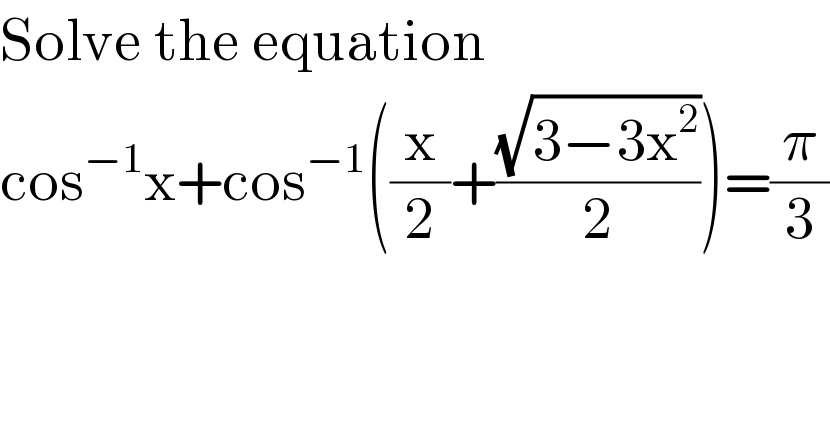
Question and Answers Forum
Question Number 48361 by peter frank last updated on 22/Nov/18

Commented by MJS last updated on 22/Nov/18

Answered by behi83417@gmail.com last updated on 22/Nov/18
![this is not an equation. let:a=cos^(−1) x,b=cos^(−1) ((x/2)+((√(3−3x^2 ))/2)) cosb=(x/2)+((√(3−3x^2 ))/2)=(1/2).x+((√3)/2).(√(1−x^2 ))= =cos(π/3)cosa+sin(π/3).sina=cos((π/3)−a) ⇒b=(π/3)−a⇒a+b=(π/3),for:x∈[−1,1].](Q48370.png)
| ||
Question and Answers Forum | ||
Question Number 48361 by peter frank last updated on 22/Nov/18 | ||
 | ||
Commented by MJS last updated on 22/Nov/18 | ||
 | ||
Answered by behi83417@gmail.com last updated on 22/Nov/18 | ||
![this is not an equation. let:a=cos^(−1) x,b=cos^(−1) ((x/2)+((√(3−3x^2 ))/2)) cosb=(x/2)+((√(3−3x^2 ))/2)=(1/2).x+((√3)/2).(√(1−x^2 ))= =cos(π/3)cosa+sin(π/3).sina=cos((π/3)−a) ⇒b=(π/3)−a⇒a+b=(π/3),for:x∈[−1,1].](Q48370.png) | ||
| ||